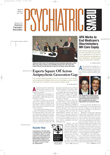Across-cultural study finds that Africans and Americans are affected similarly by terrorism. A study of this topic, reported in the June British Journal of Psychiatry, was headed by two disaster psychiatry experts, Carol North, M.D., a professor of psychiatry at Washington University in St. Louis, and Betty Pfefferbaum, M.D., chair of psychiatry at the University of Oklahoma.
The study included some 400 subjects—about half American and about half Kenyan. The Americans had been impacted by the bombing of a federal office building in Oklahoma City in 1995, the Kenyans by the bombing of the U.S. Embassy in Nairobi in 1998.
Six to 10 months after these terrorist incidents, the subjects were evaluated to learn how the incidents had affected them psychologically and how they had coped with them. The main instrument the researchers used was the Disaster Supplement of the Diagnostic Interview Schedule, which has been used to study more than 2,000 disaster victims in the United States. It provided information about exposure to the disaster, subjective perceptions, functional status, coping methods, and treatment. Diagnoses were made using DSM-IV criteria.
Assessment of the Kenyan subjects was conducted by eight Nairobi mental health professionals who had been trained in interviewing and in using such diagnostic instruments. Also, the Kenyans were asked virtually the same questions that the Americans were asked, except that occasionally words or phrases were substituted to make the questions more culturally appropriate for them. For example, they were not asked whether they felt “blue,” but rather “empty,” since empty, not blue, connotes a negative mood for Kenyans.
“I was. .impressed with how differently people in these two cultures coped and sought help for their problems.”
When the researchers compared the responses, they found that despite geographic separation by nearly half a world, the American subjects and the Kenyan subjects responded quite similarly to being terrorism victims. For example, posttraumatic functional impairment, defined as interference with work or relationships with family and friends, occurred among 40 percent of Kenyan subjects and 39 percent of American ones. Almost a third of male Kenyan subjects and a little over half of female Kenyan subjects experienced bombing-related posttraumatic stress disorder (PTSD). By comparison, 19 percent of male American subjects and 38 percent of female American subjects did. Thus, female subjects in both Kenya and the United States were more susceptible to bombing-related PTSD than male subjects in the two countries.
Most Kenyan subjects and most American subjects met DSM-IV PTSD criteria B and D—that is, a persistent re-experiencing of the traumatic event and persistent symptoms of increased arousal—but not criterion C, which is persistent avoidance of stimuli associated with the trauma and numbing of general responsiveness. However, 90 percent of both American and Kenyan subjects who met criterion C also met full diagnostic criteria for PTSD.
The means by which the Kenyan and American subjects coped with their trauma differed somewhat, the investigators learned. For instance, while subjects in both groups turned to family and friends for support, the Americans were more likely to use medications and alcohol to cope, while the Kenyans were more likely to use religion.
“In our study,” North told Psychiatric News, “I was impressed with the similarities in the presentations of psychiatric disorders after terrorist bombings in survivors of the bombings in Oklahoma City and in Nairobi, but I was equally impressed with how differently people in these two cultures coped and sought help for their problems. The specifics we found pertaining to similarities and differences in these two cultures may be a first step toward resolving apparently differing evidence about the expression of disaster mental health effects internationally.”
These findings have some practical implications for helping both Americans and Africans affected by terrorism, the researchers pointed out in their report. For example, screening both Americans and Africans impacted by terrorism for PTSD criterion C symptoms might be a good way to identify individuals with a high likelihood of developing PTSD and thus in need of more intensive psychiatric care.
The study was funded by the National Institute of Mental Health, National Memorial Institute for the Prevention of Terrorism and the Office for Domestic Preparedness, U.S. Department of Homeland Security, and U.S. Agency for International Development.
Br J Psychiatry 2005 186 487
